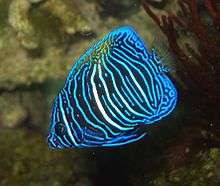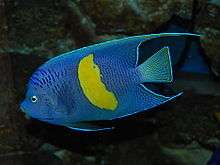Pomacanthus maculosus
Pomacanthus maculosus is a marine angelfish with common names including halfmoon angelfish, yellowband angelfish, yellowbar angelfish, Arabian yellowbar angelfish, yellow-blotch angelfish, and yellow-marked angelfish.[1] The species lives mainly in coral and rocky areas, in shallow to moderate depths (forty feet), though it is more often in silty reef areas than in rich coral growth. It occasionally makes its way into the aquarium trade.

| Pomacanthus maculosus | |
|---|---|
 | |
| Scientific classification | |
| Kingdom: | |
| Phylum: | |
| Class: | |
| Order: | |
| Family: | |
| Genus: | |
| Species: | P. maculosus |
| Binomial name | |
| Pomacanthus maculosus (Forsskål, 1775) | |
| Synonyms[2] | |
| |
Appearance
This angelfish grows to a size of 50 cm in length. It is very similar in appearance to the asfur angelfish (P. asfur), which is found in overlapping habitats in the Persian Gulf and Red Sea. The halfmoon angelfish can be distinguished from the asfur primarily by its tail color, which is pale to clear, while the asfur's tail is bright yellow.
As with other large angelfish in genus Pomacanthus, juveniles and sub-adults are differently marked and colored than adults. Small halfmoon angelfish are alternately blue, white, and black banded.
Distribution
Pomacanthus maculosus is distributed throughout the Persian Gulf, the northwestern Indian Ocean, and the Red Sea south to 19°S.[3] In 2009 it was recorded off the coast of Lebanon in the eastern Mediterranean, probably as a result of Lessepsian migration from the Red Sea through the Suez Canal.[4] There have since been records off Israel and the species is now considered to be established in the Levantine Sea.[5]
Diet
This species has a diet typical of angelfishes. Its main food is sponges. It also eats small anemones, algae, tubeworms, and shrimp.
References
- Pyle, R., et al. 2010. Pomacanthus maculosus. In: IUCN 2012. IUCN Red List of Threatened Species. Version 2012.2. Downloaded on 05 June 2013.
- "Synonyms of Pomacanthus maculosus (Forsskål, 1775)". Fishbase.org. Retrieved 1 February 2017.
- Pascualita Sa-a; Nicolas Bailly (2016). R. Froese; D. Pauly (eds.). "Pomacanthus maculosus Forsskål, 1775)". Fishbase.org. Retrieved 1 February 2017.
- Michel Bariche (2010). "First record of the angelfish Pomacanthus maculosus (Teleostei: Pomacanthidae) in the Mediterranean" (PDF). aqua, International Journal of Ichthyology. 16 (1): 31–33.
- Pierre Salameh; Oren Sonin; Dor Edelist; Daniel Golani (2012). "The first substantiated record of the yellowbar angelfish, Pomacanthus maculosus (Actinopterygii:Perciformes:Pomacanthidae) in the Mediterranean" (PDF). Acta Ichthyologica et Piscatoria. 42 (1): 73–74.
- Froese, Rainer and Pauly, Daniel, eds. (2008). "Pomacanthus maculosus" in FishBase. December 2008 version.
| Wikimedia Commons has media related to Pomacanthus maculosus. |
| Wikispecies has information related to Pomacanthus maculosus |
